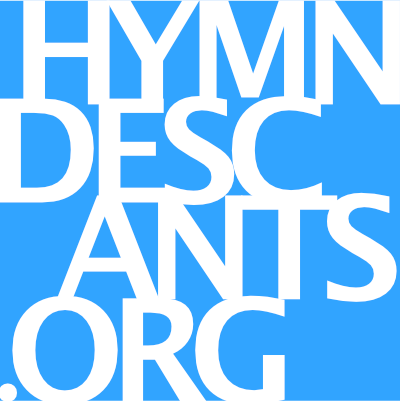Audio Demo: Hymnal harmonization (RVW) / SATB a cappella (adapt. RVW) / harmonized descantFree score
1 unison
Christ the fair glory of the holy angels,
maker of all things, ruler of all nature,
grant of thy mercy unto us they servants
steps up to heaven.
5 satb adapt. from RVW
May the blest mother of our Lord and Savior,
may the celestial company of angels,
may the assembly of the saints in heaven
help us to praise thee.
6 descant
Father almighty, Son, and Holy Spirit,
God ever blesséd, hear our thankful praises;
thine is the glory which from all creation
ever ascendeth
The tune known as CHRISTE SANCTORUM is in the class of the 'French diocesan tunes' that emerged in the 18th C antiphonaries (roughly similar to today's pew missals) and method books. But the mystery is how this tune acquired its name as it did not appear with the hymn bearing the incipit Christe sanctorum decus angelorum, but rather with two other hymns, the Marian hymn Ceteri nunquam nisi vagiendo, and an ordination hymn, Christe pastorum caput atque princeps, as seen in an instructional volume by François de la Feillée, Méthode de Plaint-Chant (1823). The oft-cited 1681 Paris Antiphoner assigns a different melody to Christe sanctorum decus angelorum. It is a mystery as to how this tune came to acquire its name. These sources give the melody only in square note neumes, though organ accompaniment books for these tunes were also in circulation. This majestic harmonization by Ralph Vaughan Williams was composed for the 1906 English Hymnal.
The hymn Christe sanctorum decus angelorum ('Christ, the fair glory of the holy angels'), is a 9th C. office hymn for the Feast of St Michael and All Angels, a hymn of 'the church triumphant' that celebrates by name the celestial visitors who have graced this earth, and once again calls on them to renew their graces: Christ the Savior, three archangels (Michael, defender; Gabriel, herald; Raphael, healer), Mary, the saints, and all the company of angels. The hymn concludes with a Gregorian doxology.
Though this tune is usually paired with the Matins (midnight) hymn Father we praise thee, a vernacular rendering by Percy Dearmer of Nocte surgentes for the 1906 English Hymnal and sung today as a morning hymn. Though attributed to Gregory the Great (6th C) it's earliest attestation is some four centuries later. That the original only mentions 'Father' in the doxology - not the first verse, never mind the first word - and office hymns greeting the a new day are not in common congregational currency, this text is problematic. Hence we have paired this tune to its eponymous hymn, Christe sanctorum. Fred Pratt Green, who began writing hymns after retirement wrote "Christ is the world's light," a popular pairing with this tune. It was written in 1969 for Hymns and Songs, a supplement to the Methodist Hymnal in Great Britain (copyright held by Hope Publishing). The English version of the Latin hymn Christe sanctorum is also sung to another French tune from the same period, COELITES PLAUDANT.
We have provided a blank musix xml file for music directors who wish to assign a a different text in 11.11.11.5 Sapphic meter. A list of texts in this meter can be found on The Hymnary website.
References
- David's Hymn Blog, Father, we praise thee, David Russell Hamrick
- hymnstudiesblog, Father, we praise thee
- History of Hymns, UMC Discipleship Ministries, Christ is the world's light, Tyler Ferguson
- Hymnoglypt, Christe sanctorum decus (corr. H. Bonnus), Matthew Carver (Matthaeus Glyptes)
This page updated Sept 22, 2023
Includes full hymn, ad lib SATB verse, and harmonized descant
Blank score (music xml)
Descant text (Christ the fair glory):
Father Almighty, Son, and Holy Spirit,
God ever blessed, hear our thankful praises;
Thine is the glory, which from all creation
ever ascendeth.
– Rabanus Maurus 9th C
Father, we praise thee:

